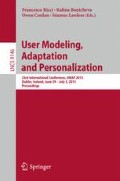Abstract
Open Student Modeling (OSM) is a popular technology that makes traditionally hidden student models available to the learners for exploration. OSM is known for its ability to increase student engagement, motivation, and knowledge reflection. A recent extension of OSM known as Open Social Student Modeling (OSSM) attempts to enhance cognitive aspects of OSM with social aspects by allowing students to explore models of peer students or the whole class. In this paper, we introduce MasteryGrids, a scalable OSSM interface and report the results of a large-scale classroom study that explored the value of adding social dimension to OSM. The results of the study reveal a remarkable engaging potential of OSSM as well as its impact on learning effectiveness and user attitude.
Access this chapter
Tax calculation will be finalised at checkout
Purchases are for personal use only
Preview
Unable to display preview. Download preview PDF.
Bibliography
Ahn, J.-w., Brusilovsky, P., Grady, J., He, D., Syn, S.Y.: Open user profiles for adaptive news systems: help or harm? In: Proc. of the 16th international conference on World Wide Web, WWW 2007. ACM, pp. 11–20 (2007)
Brusilovsky, P., Sosnovsky, S., Lee, D., Yudelson, M., Zadorozhny, V., Zhou, X.: Learning SQL programming with interactive tools: from integration to personalization. ACM Transactions on Computing Education 9(4), 1–15 (2010). Article No. 19
Bull, S.: UMPTEEN: Named and Anonymous Learner Model Access for Instructors and Peers. International Journal of Artificial Intelligence in Education 17(3), 227–253 (2007)
Bull, S., Kay, J.: Student Models That Invite the Learner The SMILI:() Open Learner Modelling Framework. International Journal of AI in Education 17(2), 89–120 (2007)
Bull, S., Kay, J.: Open Learner Models as Drivers for Metacognitive Processes. In: Azevedo, R., Aleven, V. (eds.) International Handbook of Metacognition and Learning Technologies, pp. 349–365. Springer, Berlin (2013)
Corbett, A.T., Anderson, J.R.: Knowledge tracing: Modelling the acquisition of procedural knowledge. User Modeling and User-Adapted Interaction 4(4), 253–278 (1995)
Hsiao, I.-H., Brusilovsky, P.: Motivational Social Visualizations for Personalized E-Learning. In: Ravenscroft, A., Lindstaedt, S., Kloos, C.D., Hernández-Leo, D. (eds.) EC-TEL 2012. LNCS, vol. 7563, pp. 153–165. Springer, Heidelberg (2012)
Hsiao, I.-H., Sosnovsky, S., Brusilovsky, P.: Guiding students to the right questions: adaptive navigation support in an E-Learning system for Java programming. Journal of Computer Assisted Learning 26(4), 270–283 (2010)
Hsiao, I.H., Bakalov, F., Brusilovsky, P., König-Ries, B.: Progressor: social navigation support through open social student modeling. New Review of Hypermedia and Multimedia 19(2), 112–131 (2013)
Loboda, T.D., Guerra, J., Hosseini, R., Brusilovsky, P.: Mastery Grids: An Open Source Social Educational Progress Visualization. In: de Freitas, S., Rensing, C., Ley, T., Muñoz-Merino, P.J. (eds.) EC-TEL 2014. LNCS, vol. 8719, pp. 235–248. Springer, Heidelberg (2014)
Mitrovic, A., Martin, B.: Evaluating the Effect of Open Student Models on Self-Assessment. International Journal of AI in Education 17(2), 121–144 (2007)
O’Keeffe, I., Brady, A., Conlan, O., Wade, V.: Just-in-time Generation of Pedagogically Sound, Context Sensitive Personalized Learning Experiences. International Journal on E-Learning 5(1), 113–127 (2006)
Paas, F., van Merriënboer, J.J.G.: The efficiency of instructional conditions: An approach to combine mental effort and performance measures. Human Factors 35, 737–743 (1993)
Paas, F., van Merriënboer, J.J.G.: Instructional control of cognitive load in the training of complex cognitive tasks. Educational Psychology Review 35(6), 51–71 (1994)
Papanikolaou, K.A., Grigoriadou, M., Kornilakis, H., Magoulas, G.D.: Personalising the interaction in a Web-based Educational Hypermedia System: the case of INSPIRE. User Modeling and User Adapted Interaction 13(3), 213–267 (2003)
Weber, G., Brusilovsky, P.: ELM-ART: An adaptive versatile system for Web-based instruction. International Journal of Artificial Intelligence in Education 12(4), 351–384 (2001)
Author information
Authors and Affiliations
Corresponding author
Editor information
Editors and Affiliations
Rights and permissions
Copyright information
© 2015 Springer International Publishing Switzerland
About this paper
Cite this paper
Brusilovsky, P., Somyürek, S., Guerra, J., Hosseini, R., Zadorozhny, V. (2015). The Value of Social: Comparing Open Student Modeling and Open Social Student Modeling. In: Ricci, F., Bontcheva, K., Conlan, O., Lawless, S. (eds) User Modeling, Adaptation and Personalization. UMAP 2015. Lecture Notes in Computer Science(), vol 9146. Springer, Cham. https://doi.org/10.1007/978-3-319-20267-9_4
Download citation
DOI: https://doi.org/10.1007/978-3-319-20267-9_4
Published:
Publisher Name: Springer, Cham
Print ISBN: 978-3-319-20266-2
Online ISBN: 978-3-319-20267-9
eBook Packages: Computer ScienceComputer Science (R0)

